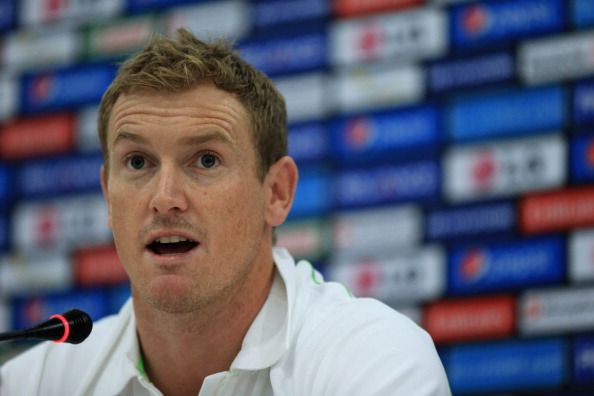
ICC World Cup T20 - The teams that matter

George Bailey, Captain of Australia talks to the media during a Headshot session at the Ruposhi Bangla Hotel ahead of the ICC World Twenty20 Bangladesh 2014 on March 18, 2014 in Dhaka, Bangladesh.
The fifth edition of the ICC World T20 got under way in Bangladesh earlier this week. This edition of the World Cup is the biggest both in terms of number of teams participating (16 teams) and number of matches that will be played. The ICC has taken a right step by choosing the shortest format to give the minnows a feel of the big stage, as the probability of having lopsided T20 matches is less as compared to what we have seen in the 50-over World Cup, where minnows have merely made up the numbers barring one or two upsets.
The Super 10 stage, as it is being called, starts on the 21st of March, with the arch rivals India and Pakistan locking horns at Mirpur. Here’s a look at the contenders for the biennial event.
Australia: After some of the reverses they suffered in India and England last year, Australia have bounced back brilliantly in the Ashes and on their tour to South Africa, thereby becoming the most improved team in the last six months. With a fearsome bowling attack despite the absence of their linchpin Mitchell Johnson and a destructive batting line-up, Australia seem the most balanced of all teams participating in this edition of World T20. Add to that, they have two old war horses in Brad Hogg and Brad Hodge, who are masters in their respective art when it comes to this format. By covering all the bases, Australian selectors have ensured that they start as the favourites to win the only world title that is missing from their trophy cabinet.
Sri Lanka: Besides being the No.1 ranked T20 team in the world, Sri Lanka also have a clear advantage of knowing the conditions in Bangladesh well, with their team having spent almost two months in the world’s most densely populated country. Not only is Sri Lanka placed in Group 1, which is relatively an easier group, but they also have a right mix of youth and experience in their squad. Having featured in four finals in both the 50-over and 20-over World Cups in the last seven years, Dinesh Chandimal and Co. would love to give their two stalwarts, Kumar Sangakarra and Mahela Jayawardene, a fitting farewell from the shortest format.
Pakistan: Pakistan generally have a reputation of being consistently inconsistent, but they have been the best team in the World T20′s short history, never failing to make the semi-finals. The Mohammad Hafeez-led side has the variety and depth in their bowling which can pose enough problems for their opponents provided their batting, which has been their Achilles heel, posts decent totals on the board. Slotted in the group of death against two former champions in West Indies and India, Pakistan will have their work cut out if they are to make the fifth semi-final appearance in a row.
West Indies : They not only won the last edition of the ICC World T20 in Sri Lanka but also many supporters with their entertaining brand of cricket. A team comprising of T20 superstars, for whom franchises around the world are ready to loosen their purse strings, West Indies are the Pakistan of West, blowing hot one day and cold on another. They are heavily dependent on a strong top order coupled with the guile and accuracy of Sunil Narine and Dwayne Bravo. With two good games against three teams ranked higher than them in the ICC rankings, they might well be on their way to the semifinals.
India: India is to cricket as England is to football. Both countries boast of the most expensive leagues in these respective sports, and yet they fail to make an impact when it comes to the world event. There is a talk in some quarters: with no International T20 exposure in last eight months, can India have any impact in the tournament?
For starters, India won the inaugural ICC World T20 when the format itself was at a nascent stage and IPL was yet to be born. So the lack of international exposure shouldn’t be as much of a worry for India as their inexperienced bowling unit or the fragile opening partnership. With India playing almost all their matches in the evening, dew will be a huge factor; it might just mean that Amit Mishra will warm the benches again, leaving majority of work to be done by its inexperienced medium pacers. Indian line-up possesses few of the most destructive T20 batsmen, particularly in sub-continental conditions and, if they come good collectively, India have a good chance to break the jinx of not progressing through to the semi-finals after that famous win in Johannesburg.
The Outsiders:
New Zealand is one unit which can’t be discounted particularly when it comes to the ICC events. With their recent showing against India and West Indies at home, they would be high on confidence. Though the conditions in New Zealand and Bangladesh are as different as chalk and cheese, Black caps have a balanced unit, and it won’t be a surprise if they make it to the semis ahead of South Africa from Group 1.
South Africa, on the other hand, look a little pale given the conditions in Bangladesh. First up they would be hoping that their premier fast bowler Dale Steyn and their captain Faf du Plessis are fit to take the field. The No.1 ranked Test team, however, can’t be written off. With a couple of inspirational performances in their group games against New Zealand and Sri Lanka, they might well knock on the doors of the semi-finals.
England, Ireland (most probably) and Bangladesh ranked eighth, ninth and tenth, respectively, in the ICC T20 rankings, are the other teams making up the Super 10. It would even be a surprise to themselves if they progress through the group stages.
Time to fasten the seat belts and get ready for an exciting couple of weeks of cricket.